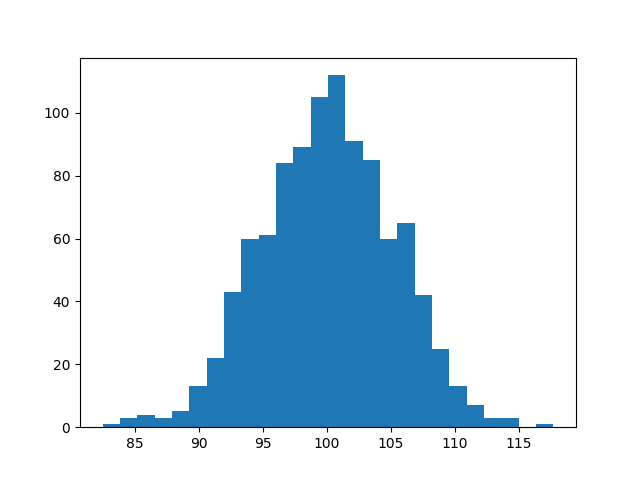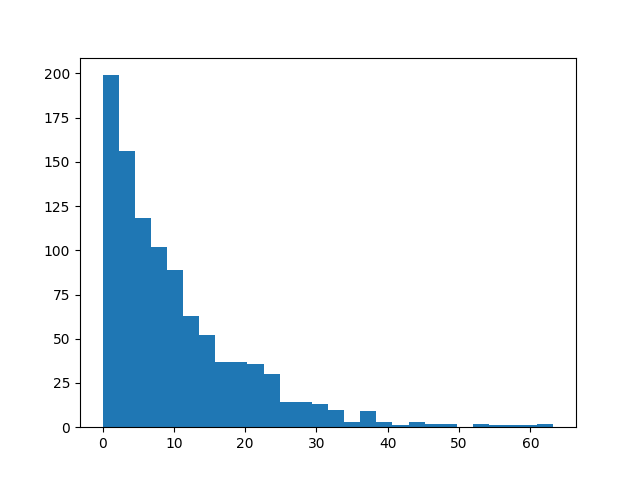CLI generation and plotting of random variables
In addition to the standard range function, we support infinite generators
exponential(lambd):lambdis 1.0 divided by the desired mean.uniform(a, b): Get a random number in the range[a, b)or[a, b]depending on rounding.gauss(mu, sigma):muis the mean, andsigmais the standard deviation.normal(mu, sigma): as abovelognormal(mu, sigma): as abovetriangular(low, high): Continuous distribution bounded by given lower and upper limits, and having a given mode value in-between.beta(alpha, beta): Conditions on the parameters arealpha > 0andbeta > 0. Returned values range between 0 and 1.gamma(alpha, beta): as aboveweibull(alpha, beta):alphais the scale parameter andbetais the shape parameter.pareto(alpha): Pareto distribution.alphais the shape parameter.vonmises(mu, kappa):muis the mean angle, expressed in radians between 0 and2*pi, andkappais the concentration parameter, which must be greater than or equal to zero. If kappa is equal to zero, this distribution reduces to a uniform random angle over the range 0 to2*pi.
We have a special infinite generator (filter) that works on finite generators:
choice,
whose behaviour is explained below.
Finally, we have a generator
stdin()
that reads from stdin.
All generators are infinite generators, and must be sampled with sample(n)
before consuming!
Install with
pip install git+https://github.com/pgdr/clidistor simply (not possible, though)
pip install clidistThis is pure Jinja2:
>>> clidist "range(5) | list"
[0, 1, 2, 3, 4]However, to get a more UNIXy output, we use cli instead of list:
>>> clidist "range(5) | cli"
0
1
2
3
4To limit the output, we use sample(n):
>>> clidist "range(1000) | sample(5) | cli"
0
1
2
3
4That isn't very helpful on the range generator, but is much more helpful on an
infinite generator, such as the uniform generator:
>>> clidist "uniform(0, 5) | sample(5) | cli"
3.3900198868059235
1.2002767137709318
0.40999391897569126
1.9394585953696264
4.37327472704115We can round the output in case we don't need as many digits (note that round
is a generator as well and can be placed on either side of sample):
>>> clidist "uniform(0, 5) | round(2) | sample(5) | cli"
4.58
4.33
1.87
2.09
4.8The sample behavior is equivalent to the head program, or from languages
such as Haskell. The head alias is supported:
>>> clidist "uniform(0, 5) | round(2) | head(5) | cli"
4.58
4.33
1.87
2.09
4.8drop is also available:
>>> clidist "uniform(0, 5) | round(2) | drop(2) | head(3) | cli"
1.87
2.09
4.8Using choice with a finite generator gives an infinite generator that chooses
from the provided generator:
>>> clidist "range(0, 11, 2) | choice | sample(6) | cli"
8
0
8
10
4
6Jinja2 supports more generic lists, e.g., lists of string. Hence, we can write
>>> clidist "['win', 'draw', 'loss'] | choice | sample(6) | sort | cli"
draw
draw
draw
loss
win
win... and as in Python, strings are also iterable:
>>> clidist "'HT' | cli"
H
T... so we can flip six coins with
>>> clidist "'HT' | choice | sample(6) | cli"
H
T
T
H
H
HWe can flip 100 coins and count the output with counter (which is
collections.Counter)
>>> clidist "'HT' | choice | sample(100) | counter | cli"
H 47
T 53The sort functionality does not work as expected on a Counter object (a
dict type), so if we want the output sorted, we pipe through sort from
coreutils:
>>> clidist "range(1,7) | choice | sample(100) | counter | cli" | sort -n
1 24
2 17
3 18
4 16
5 14
6 11Using stdin() as a generator, we can pipe into clidist. Beware that
stdin() flushes the input, hence stdin (currently) does not work with
infinite input streams.
>>> ls | clidist "stdin() | choice | sample(1) | cli"
some_fileThen, if we ever wanted to shuffle ls we can run
>>> ls | clidist "stdin() | shuffle | cli"
some_file>>> cat FILE | c "stdin() | cli"
# NOOP; cats FILEFor fun, if you have installed matplotlib, we support plotting, hist being
the most useful.
>>> clidist "normal(100, 5) | sample(1000) | hist"An exponential distribution can be plotted with exponential(lamba). Note that
the cli output must be the last filter in the chain, as that is a command-line
utility only:
>>> clidist "normal(100, 5) | sample(1000) | hist | cli"
